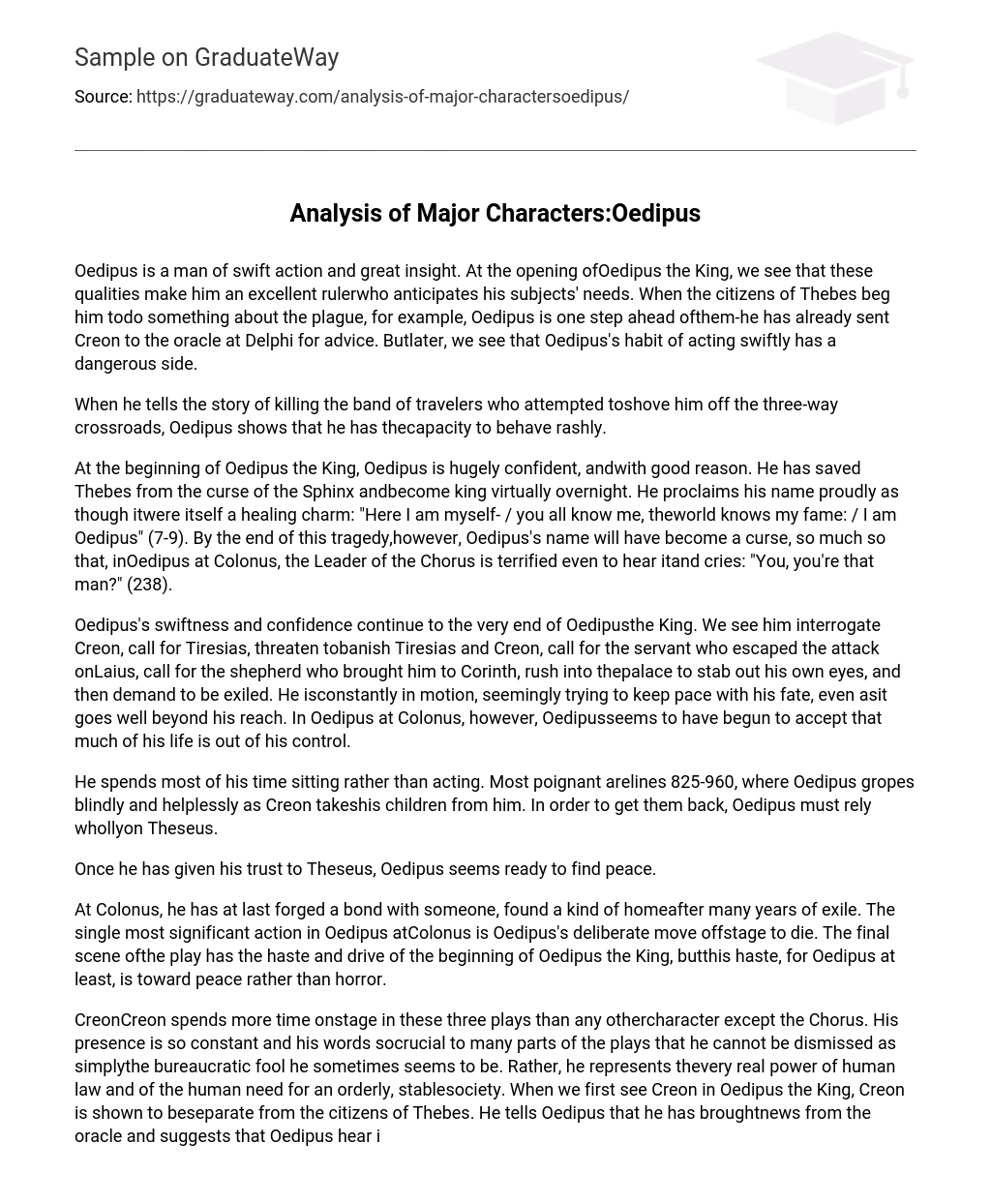Oedipus is a man of swift action and great insight. At the opening ofOedipus the King, we see that these qualities make him an excellent rulerwho anticipates his subjects’ needs. When the citizens of Thebes beg him todo something about the plague, for example, Oedipus is one step ahead ofthem-he has already sent Creon to the oracle at Delphi for advice. Butlater, we see that Oedipus’s habit of acting swiftly has a dangerous side.
When he tells the story of killing the band of travelers who attempted toshove him off the three-way crossroads, Oedipus shows that he has thecapacity to behave rashly.
At the beginning of Oedipus the King, Oedipus is hugely confident, andwith good reason. He has saved Thebes from the curse of the Sphinx andbecome king virtually overnight. He proclaims his name proudly as though itwere itself a healing charm: “Here I am myself- / you all know me, theworld knows my fame: / I am Oedipus” (7-9). By the end of this tragedy,however, Oedipus’s name will have become a curse, so much so that, inOedipus at Colonus, the Leader of the Chorus is terrified even to hear itand cries: “You, you’re that man?” (238).
Oedipus’s swiftness and confidence continue to the very end of Oedipusthe King. We see him interrogate Creon, call for Tiresias, threaten tobanish Tiresias and Creon, call for the servant who escaped the attack onLaius, call for the shepherd who brought him to Corinth, rush into thepalace to stab out his own eyes, and then demand to be exiled. He isconstantly in motion, seemingly trying to keep pace with his fate, even asit goes well beyond his reach. In Oedipus at Colonus, however, Oedipusseems to have begun to accept that much of his life is out of his control.
He spends most of his time sitting rather than acting. Most poignant arelines 825-960, where Oedipus gropes blindly and helplessly as Creon takeshis children from him. In order to get them back, Oedipus must rely whollyon Theseus.
Once he has given his trust to Theseus, Oedipus seems ready to find peace.
At Colonus, he has at last forged a bond with someone, found a kind of homeafter many years of exile. The single most significant action in Oedipus atColonus is Oedipus’s deliberate move offstage to die. The final scene ofthe play has the haste and drive of the beginning of Oedipus the King, butthis haste, for Oedipus at least, is toward peace rather than horror.
CreonCreon spends more time onstage in these three plays than any othercharacter except the Chorus. His presence is so constant and his words socrucial to many parts of the plays that he cannot be dismissed as simplythe bureaucratic fool he sometimes seems to be. Rather, he represents thevery real power of human law and of the human need for an orderly, stablesociety. When we first see Creon in Oedipus the King, Creon is shown to beseparate from the citizens of Thebes. He tells Oedipus that he has broughtnews from the oracle and suggests that Oedipus hear it inside. Creon hasthe secretive, businesslike air of a politician, which stands in sharpcontrast to Oedipus, who tells him to speak out in front of everybody.
While Oedipus insists on hearing Creon’s news in public and builds hispower as a political leader by espousing rhetoric of openness, Creon is amaster of manipulation. While Oedipus is intent on saying what he means andon hearing the truth-even when Jocasta begs and pleads with him not to-Creon is happy to dissemble and equivocate.
At lines 651-690, Creon argues that he has no desire to usurp Oedipusas king because he, Jocasta, and Oedipus rule the kingdom with equal power-Oedipus is merely the king in name. This argument may seem convincing,partly because at this moment in the play we are disposed to be sympathetictoward Creon, since Oedipus has just ordered Creon’s banishment. Inresponse to Oedipus’s hotheaded foolishness, Creon sounds like the voice ofreason. Only in the final scene of Oedipus the King, when Creon’s shortlines demonstrate his eagerness to exile Oedipus and separate him from hischildren, do we see that the title of king is what Creon desires above all.
Creon is at his most dissembling in Oedipus at Colonus, where he onceagain needs something from Oedipus. His honey-tongued speeches to Oedipusand Theseus are made all the more ugly by his cowardly attempt to kidnapAntigone and Ismene. In Antigone, we at last see Creon comfortable in theplace of power. Eteocles and Polynices, like their father, are dead, andCreon holds the same unquestioned supremacy that Oedipus once held. Ofcourse, once Creon achieves the stability and power that he sought andOedipus possessed, he begins to echo Oedipus’s mistakes. Creon denouncesTiresias, for example (1144-1180), obviously echoing Oedipus’s denunciationin Oedipus the King (366-507). And, of course, Creon’s penitent wailings inthe final lines of Antigone echo those of Oedipus at the end of Oedipus theKing. What can perhaps most be said most in favor of Creon is that in hisfinal lines he also begins to sound like Antigone, waiting for whatever newdisaster fate will bring him. He cries out that he is “nothing,” “no one,”but it is his suffering that makes him seem human in the end.





